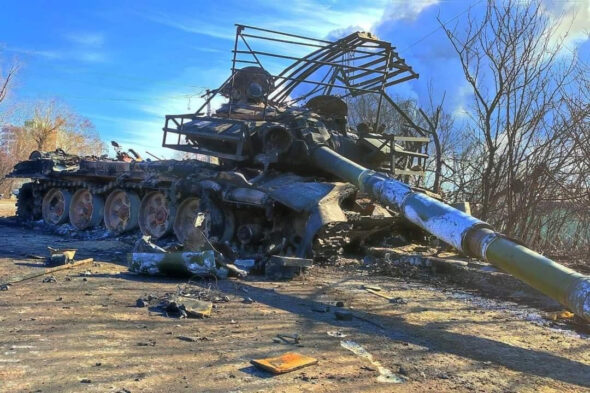Russia’s military failures are pushing it to take desperate measures. The consequences for attacking „Russian territory”, i.e. the four districts annexed by Russians, did not scare the Ukrainians. So now they are supposed to be frightened of a dirty bomb, a dam catastrophe and… a frosty winter. This is a crucial moment and the West must maintain unity and solidarity with Ukraine – writes Mariusz Marszałkowski, editor at BiznesAlert.pl.
For several months now the Ukrainian army has held the initiative in conducting combat operations against the Russian occupiers. First, most of the Kharkiv region went back under the control of Ukraine, then a counteroffensive was launched in the Luhansk region, and for several months the Ukrainian troops have been pressing Russian forces in the Kherson region. The Russians have no military response to the successes of the Ukrainian forces. The eight months of war have weakened the Russian army, its equipment is giving up due to over-exploitation, jet and helicopter crews as well as ground crews are exhausted, which causes mistakes and accidents. Russia’s jets are crash into high-voltage power lines (at least two such cases in recent months) or fall on Russian cities.
Contrary to some statements, the Western sanctions are working, which means that the Russian arms industry lacks both components and competence to produce certain items of equipment or spare parts to replace the already used military equipment. Putin’s regime is seeking help from similar dictatorships, be that the ayatollahs of Iran or the Kim dynasty of North Korea.
However, the biggest problem facing the Armed Forces of Russia are vacancies. There is a shortage of logisticians, technicians, drone operators and mechanics. The army is also short on infantry, as well as tank and armored vehicles crews and artillerymen. On paper, after eight months of bloody fighting, an army of nearly a million people has proved incapable of waging a long and grueling war. The remedy for this problem is supposed to be mobilization, which for propaganda reasons has been called partial. In fact, the povestki (mobilization call) from the voenkomats (drafting committee) go to a large part of the male population of Russians, but not only. Some signals from the internal structures reveal that Russians are drafting economic migrants from Central Asia as well. Some of the mobilized have already gone to the front, some are already in Ukrainian captivity, while others were killed or wounded.
The Russians, not having the appropriate military potential, after the initial successes were forced to defend the front, which is about a 1.5 thousand kilometers long, along many sections. Instead of a blitzkrieg, the war turned into a positional struggle akin to the First World War. The front line is divided by trenches, fortifications and minefields on both sides. From time to time, one or the other side conducts its local outings and counteroffensives, which end with varying effect. However, the Ukrainian side has a much more positive balance in this aspect than the Russian side.
Desperate moves
The Russians, who cannot achieve their goals through war, are moving to more and more desperate means. Since October 10, there have been missile and drone attacks on Ukraine’s energy infrastructure. The targets of the shelling were power plants and heating plants, high-voltage lines, switchgear and transformer stations, as well as other key facilities from the perspective of the functioning of the Ukrainian energy sector.
According to Maksim Timchenko, CEO of DTEK, Ukraine’s largest private energy company owned by Ukraine’s richest man Rinat Akhmetov, about 40 percent of the country’s energy infrastructure has been damaged in Russian missile attacks since October 10. Earlier, Ukraine lost the equivalent of 10 GW of power generation capacity as a result of the occupation or damage and destruction of several power generation facilities, including the seizure by Russian troops of the Zaporozhye Nuclear Power Plant in Energodar.
These attacks serve the propaganda and were supposed to be Russia’s response to the Kerch Bridge partial collapse. However, in fact, given the appointment of gen. Sergei Surovikin, commonly referred to as the „butcher of Syria”, as the commander-in-chief of the operation against Ukraine, it can be said that these actions were deliberate, and calculated to have long-lasting impact.
Energy infrastructure is a key element of the functioning of each state. It is essential for the economy as well as the society. Today it is difficult to imagine us functioning without power, while virtually all devices in households work thanks to electricity. It is also difficult to imagine living without access to heat from urban heat and power plants. This is hard to imagine especially in October, when the aura outside the window forces one to put on warmer clothes and open the radiators. Attacking civilian infrastructure that provides cities and villages with basic utilities is reprehensible and indefensible. Military units often have their own sources of energy and heat, so the destruction of civilian infrastrcuture in the face of the approaching frost and winter appears to be a deliberate harassment of the civilian population. But it has a deeper foundation.
While in the east of Ukraine people are aware of the danger, on the western borders of our eastern neighbor, or in Kyiv, people who do not hear the daily shelling and jets bombing cities and villages forget about the ongoing hell and want to live „normally”. The Russians, who are not successful at the front and have great difficulties with access to people and equipment, decided that it would be easiest to win the war thanks to the coming winter.
On the one hand, the energy crisis in the West is growing. Gas, oil, coal and electricity prices are at historic records. Many economies have not yet fully recovered from the raging coronavirus pandemic. Unemployment is rising and the society is getting poorer. Anger and frustration are growing, and we still don’t even have a full autumn with its low temperatures. Europeans, deprived of warmth in their homes, are supposed to be the key to Russia’s strategic success – withholding or reducing military, material, financial and political assistance to Ukrainians. The lack of support, with Russian mobilization and a kind of strategic pause, could lead to the defeat of Ukraine. Is Putin ready to pay a high price for the possible success? It seems that tens of thousands of dead soldiers, thousands of cripples and huge financial losses do not matter to the Kremlin regime.
The Russian bear should go to bed
The coming months will prove crucial to the fate of this eight-year war. Ukrainians have shown that they do not lack enthusiasm to defend their homeland. Meanwhile, the Russians are bringing up more and more absurd theories. From chemical and biological attacks arranged by joint Ukrainian-American laboratories, to a plan to blow up the water dam on the Kakhovka reservoir, to warning the world against a „dirty bomb”, that is, a „homemade” atomic bomb. All this shows that Russia’s real plan today is only to threaten and attack civilians and energy facilities. The West must continue to help Ukraine. Russia’s alliance with Iran shows that the world we wanted to see before February 24th has gone into oblivion. Today, all we have to do is tame the „bear” and make it fall into winter sleep. Preferably eternal.









